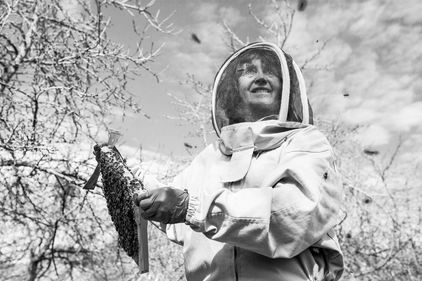|
Master beekeeper Lynne Ingram from Somerset is working with scientists from Exeter University and Jersey beekeepers this week in the fight against deadly Asian hornets which are wreaking havoc on honeybees in the Channel Isles.
Lynne, from East Huntspill, is part of a team using ground-breaking radio telemetry to track the deadly and invasive Asian hornets back to their nests where they can be destroyed. “This trip is an opportunity to observe Asian hornets at first hand so when they are found here I can provide support to local beekeepers,” said Lynne. “Asian hornets are a massive threat to our honeybees and other pollinators and if they get established here could have a massive impact on our insect population.” The first Asian hornet was spotted in Jersey two years ago and they have spread so rapidly that last week alone they destroyed seven honeybee colonies. In France the first Asian hornet was spotted in 2004 and so far this year thousands of nests have been removed. “Asian hornets would cause irreparable damage to our environment by decimating pollinators which are responsible for one in three mouthfuls of the food we eat.” The UK’s first Asian hornet week will be held on September 10-16 and is timed to coincide with the last chance to prevent the emergence of new Asian hornet queens. The public is urged to join beekeepers to look for the non-native and highly invasive insect and report any sightings, preferably with a photo, to [email protected] Asian hornets are slightly smaller than native European hornets, have a distinctive black/dark brown thorax; brown abdominal segments with the fourth segment almost entirely yellow-orange, brown legs with yellow ends, a black head and an orange-yellow face. Ends Note to editors: Somerset Beekeepers’ Association is made up of 12 divisions and works to advance the craft of apiculture within its membership and to promote general awareness and understanding of honeybees. Comments are closed.
|
Archives
September 2023
Categories
All
|
Somerset Beekeepers Association Charity © 2021 Registered CIO Charity 1206483
Affiliated to the British Beekeepers Association
Click here to view our Privacy Policy
Affiliated to the British Beekeepers Association
Click here to view our Privacy Policy

 RSS Feed
RSS Feed
